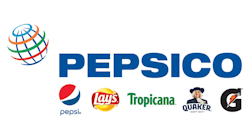PepsiCo, Inc. reported net revenue growth of 4 percent and constant currency net revenue growth of 5 percent in the first quarter. Reported EPS was $0.71 and core EPS was $0.69, in line with management's expectations. Management reaffirmed both its 2012 core constant currency EPS guidance and long-term financial targets and stated that its 2012 strategic initiatives are on track.
"Our first quarter results reflect the strength of our brands which allowed us to implement significant pricing actions," said PepsiCo Chairman and CEO Indra Nooyi in a prepared statement. "Effective pricing and packaging initiatives drove 5 percent constant currency net revenue growth, allowing us to substantially offset approximately $300 million in commodity cost inflation."
"With disciplined pricing now in place, we're doubling our focus on the other key initiatives for 2012. Our top priorities include stepping up our brand support through increased advertising and marketing, accelerating our innovation, and driving an aggressive productivity agenda that includes a significant restructuring program.
"All of these initiatives were launched in Q1 with good results, are on track, and will gain momentum as the year progresses. We're executing on a clear, deliberate game plan that will enhance our competitiveness while also positioning PepsiCo for sustainable growth and value creation for the long term."
Frito Lay North America net revenue grew 4 percent, reflecting 6 percentage points of effective net pricing. Net revenue growth was particularly strong in the c-store, dollar and foodservice channels, supported by innovation and increased media spending.
Volume performance was negatively impacted by approximately 2 percentage points due to the extra week of results in 2011, which caused the key pre-New Year's holiday week to be included in the fourth quarter of 2011 rather than in the first quarter of 2012.
Operating profit growth of 2 percent reflected the net revenue growth and productivity gains partially offset by commodity cost inflation.
Latin America net revenue grew 11 percent reflecting volume growth and 11 percentage points of effective net pricing, offset by unfavorable currency translation of 6 percentage points.
Volume grew 15 percent, reflecting a 10-percentage-point benefit from acquisitions and 4.5 percent organic volume growth. Organic volume gains were led by mid-single-digit growth in Mexico.
Operating profit grew 10 percent as volume gains, positive effective net pricing and productivity initiatives offset commodity cost inflation, an 8-percentage-point unfavorable currency translation impact, and a net 5-percentage-point negative impact from acquisitions and divestitures.
Quaker Foods North America net revenue declined 3 percent and volume declined 5 percent, reflecting general category trends. Operating profit declined 10 percent, primarily reflecting the benefit from an inventory accounting change recorded in the prior year, which contributed 7 percentage points to the decline.
PepsiCo Americas (PAB) net revenue declined 2 percent, primarily reflecting the impact of the refranchising of the division's beverage business in Mexico, which reduced net revenue by 4 percentage points. Net revenue performance also reflected 4 percentage points of effective net pricing. Excluding the impact of the Mexico refranchising, net revenue increased 2 percent.
PAB volume declined 1 percent in the quarter, with gains in Latin America offset by a decline in North America. Non-carbonated beverages grew 1 percent offsetting a 2 –percentage-point decline in CSDs. The decline in North America in part reflects the impact of pricing actions taken. Immediate consumption packaged beverage volume in North America grew high-single-digits, driven by strong retail execution. Growth in Latin America was led by double-digit gains in Mexico, high-single-digit growth in Argentina and mid-single-digit growth in Brazil.
Operating profit declined in the quarter, primarily as a result of increased commodity costs which offset the benefits of net pricing and savings resulting from recent restructuring activities.





